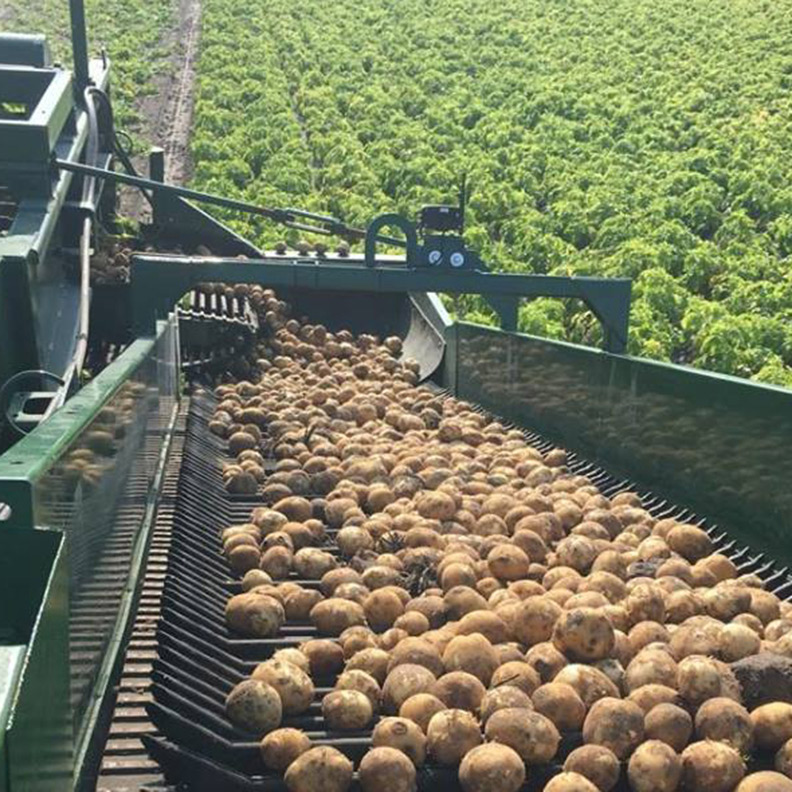It’s not every day that you hear about a fourth-generation family business known for its innovative technology, industry leadership, and sustainable practices. Black Gold Farms, a leading supplier of chip potatoes based in Grand Forks, ND, is one such company – and one that Bremer Bank is proud to call a longtime customer.
What began in 1928 on 10 acres in North Dakota is now 25,000 acres of farmland across more than 10 states. It all started when founder A.E. (Hallie) Halverson, a Forest River, ND banker, found himself the unlikely owner of a 10-acre seed potato plot as trade for a failed loan collection. He farmed the land as a side business to his banking career, effectively launching the Red River Valley’s potato farming legacy.
Halverson also established a family legacy that has inspired decades of growth for Black Gold Farms. His son Jack led the company through the ‘50s, ‘60s and ‘70s when the company portfolio expanded to include Black Angus cattle and Kennebec potatoes for the potato chip trade. It was during Jack’s tenure that the company name was changed from Forest River Potato Co. to Black Gold Farms – “Black” symbolizing the fertile, truly deep ebony black soil of the Red River Valley, as well as the color of the hide of the Registered Black Angus cattle raised on the farm, and “Gold” representing the golden skin color of the potatoes grown at that time, as well as hope for the potential value of the newly named company.
In the 1980’s, Jack’s son Gregg took over the management of the business, expanding into Missouri, exiting the cattle business, and becoming a major supplier for Frito Lay. Under Gregg’s leadership, the company has experienced explosive growth across the U.S. with a focus on potatoes for chips, red potatoes for the fresh market and sweet potatoes. In 2014, the torch was passed to the fourth generation of Halversons when Gregg’s son Eric was named chief executive officer. Gregg remains chairman of the board; son John is the chief operating officer; and daughter Leah Halverson oversees new business development and marketing.
The fourth generation is demonstrating a keen understanding of what it means to lead a growing business in the digital era. In a post on the company’s blog (fittingly called The Dirt) in December 2016, CEO Eric Halverson talks about using reflection “to allow ourselves gratitude for what we do and humbly direct us to what we can improve.” He recognizes members of the Black Gold Farms team, and talks about the importance of relationships and the value of understanding customer expectations. At a time when public trust in leaders is diminishing, this style of open, authentic leadership messaging is refreshing.
Black Gold Farms also understands the importance of growing food responsibly. The company’s commitment to fertile soil, fresh air and clean water is backed up by their adoption of new-generation technology like fuel-efficient power units and field-based sensor technology. The company annually calibrates irrigation pivot output to ensure optimum application timing and conserve water. The corporate office is LEED certified, and LEED construction techniques are used whenever possible in new buildings.
The innovation that drives Black Gold Farms’ agricultural practices is also evident in its marketing, featuring tongue-in-cheek social media posts like “It’s the Wedgie Everyone Wants” with a gorgeous image of a seasoned potato wedge, and “Local Beauty” with a shot of a robust red potato wearing a “Miss Red River Valley” sash during the red potato harvest. As Leah Halverson told Growing Produce in January, “The most important thing that I have learned…is to not be afraid to ask questions, give your opinion, or try something new. This is an industry looking for innovation, and looking to help others.”
Beyond innovative approaches to environmental sustainability and marketing, Black Gold Farms demonstrates a steadfast commitment to long-term, mutually beneficial relationships with employees, land partners, vendors and customers. Its philosophy and culture are defined by simple, straightforward statements, such as “Add value that the customer values,” “The more everyone knows, the more we accomplish,” “The whole is greater than the sum of the parts,” and “Change creates opportunity.”
Each of these statements influences how Black Gold Farms has engaged with Bremer for decades. “Bremer is much more than just the bank on the corner,” said Eric Halverson, CEO, Black Gold Farms. “Through the Bremer team’s genuine interest in learning our business, they’ve become a trusted resource and strategic partner. Like Black Gold Farms, Bremer builds authentic, enduring relationships.”
